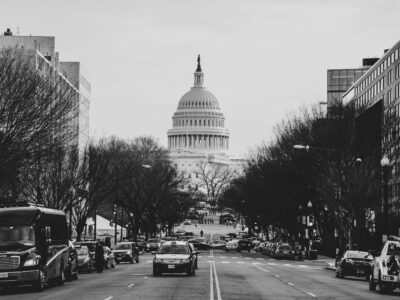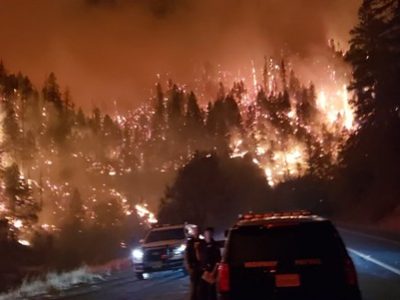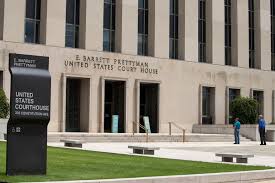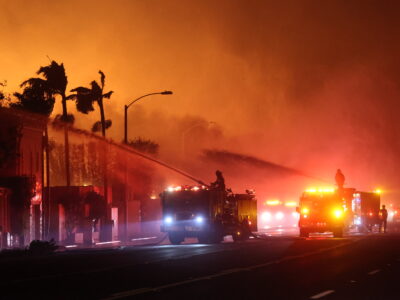Project 2025 Envisions Congressional Override of Biden Era Regulations
Paper #2 in Monograph Series
UC Berkeley’s Center for Law, Energy, & Environment (CLEE) is sponsoring a series of papers evaluating aspects of Project 2025, The Heritage Foundation publication, entitled “Mandate for Leadership: The Conservative Promise,” which is being followed to a significant degree as a blueprint for the Trump Administration. CLEE published excerpts from the 922 page Project 2025 document related to climate change and environment, here. Monograph Paper #1 on Over...
CONTINUE READINGWhat is a species?
Revisiting a key case in the history of the ESA
This article in the NY Times covers a recent scientific article that concludes that the snail darter, a fish species in the Tennessee River basin that was previously listed for protection under the Endangered Species Act (ESA), is not a species after all. Using a range of genetic analyses, the authors conclude that the snail darter is closely related to another darter species (the Stargazing Darter), and that the genetic “distance” between those two species is much...
CONTINUE READINGSaving Disaster Law From the Imperial Presidency
Trump's efforts to deconstruct disaster relief have serious legal flaws
In recent days, Trump has said that he won’t provide relief for the LA fires unless California changes its voting laws and its water regulations. And he also suggested that he’d like to abolish FEMA entirely. The first of Trump's proposals is likely unconstitutional. The second one is both a terrible idea and beyond his legal authority. Although he and Gov. Newsom made nice at an airstrip encounter, there's no reason to think Trump's view of his own power has chan...
CONTINUE READINGTrump Goes to War Against Environmental Justice
Apparently it's "woke" to worry about excessive pollution in minority communities.
An executive order dating back to Clinton requires all agencies to make environmental justice part of their missions. They are required to consider whether their actions have “disproportionately high” impacts on minority and low-income communities. Those last two sentences were true all the way through Trump’s first term and the Biden years. But no more. President Trump just revoked the Clinton order, making it clear that agencies should no longer consider how t...
CONTINUE READINGTrump’s War Against NEPA
One of Trump’s Executive Orders Heralds a Revolution in NEPA Practice
A sleeper provision in one of Trump’s executive orders attempts to revolutionize the way NEPA operates and cut environmental review to a minimum. Since Jimmy Carter’s presidency, agency compliance with NEPA has been governed by regulations issued by the White House Council on Environmental Quality. Trump aims to end that practice and replace it with agency-by-agency NEPA rules designed to reduce environmental considerations to the barest legal minimum. This slee...
CONTINUE READINGSurfing the Wave of Executive Orders
As an old song says, “Mama Miá, here we go again!”
To much fanfare, Trump has issued a slew of executive orders, many aimed at killing environmental regulations. As he portrayed his actions the day before, “Starting tomorrow, I will act with historic speed and strength and fix every single crisis facing our country.” True, many people will see the executive orders in that light. But few executive orders have any immediate impact. They’re basically nudges to various agencies to carry out his agenda. Presidents l...
CONTINUE READINGAre Climate Pledges on Life Support?
A Q&A with Catherine McKenna, who led the UN Secretary General’s High-Level Expert Group on Net-Zero Commitments of Non-State Entities.
Catherine McKenna knows firsthand how to persist in the face of pushback on climate policies. She was Canada's Minister of Environment and Climate Change during the first Trump Administration, and she led negotiations of that country’s first national climate plan over intense oil industry opposition. “The oil sands sector and the politicians they sponsor aren’t just greenwashing a product,” McKenna wrote recently in a biting Op Ed. “They are working ...
CONTINUE READINGLitigating Against Trump
Trump’s agencies had a terrible litigation record the first time. It will probably get better – but not that much better.
Later today, Trump will set in motion a wave of actions by the executive branch. And as day follows night, those actions will be followed a wave of legal challenges. That's what happened in Trump's first term, and the challenges then were successful more often than not. To give some specifics: California filed 123 separate lawsuits in Trump’s first term – about one new lawsuit every two weeks. And California was far from the only one. The Trump Administration�...
CONTINUE READINGDid California Policies Make the LA Fires Worse?
California’s environmental and climate regulations did not make the climate-fueled Palisades and Eaton fires more destructive or harder to fight. Here’s why.
We know climate change is partly to blame. Are California’s environmental policies regarding land and water management also to blame for the supercharged firestorm that has ravaged Los Angeles? It’s not just conspiracy theories on social media or misguided news stories; that’s the position of some congressional Republicans and President-elect Trump, who hold power over future federal aid to California. The UCLA Emmett Institute's Denise Grab, Cara Horow...
CONTINUE READINGCollecting useful data on NEPA
A 2024 study falls fall short in shedding light on the impacts of NEPA litigation
As I’ve recently posted, permitting reform is (appropriately) in the news right now. That means there’s also a reason for various think tanks, NGOs, academics, and others to release studies that might inform the policy debate. One such study from 2024 that has gotten some coverage on social media recently is a report by the Breakthrough Institute on NEPA litigation. Whether, how much, and in what ways NEPA litigation shapes outcomes for federal agency decisionm...
CONTINUE READING










